The Diversity in American Gods Is What Makes It American
When Neil Gaiman started writing the book almost twenty years ago, he had no idea that the diversity in American Gods would be such a controversial issue.
In fact, Gaiman’s inspiration for writing American Gods is almost ridiculous in a way. At the American Gods press day in New York City on Monday, he told us the story about when he moved to America and was simply amazed at how weird things were, but that no one else seemed to think they were weird. Things like people taking photographs of a giant replica of the world’s largest block of cheese, or a woman going outside in just her slippers and getting frozen to her driveway. (“That’s just winter!” people told Gaiman at the time.) But it was really a visit to Reykjavik, Iceland, where he truly got the idea.
“I wanted to do something about immigrants, and the fact that you’re in this country where basically everybody came here from somewhere else at one time or another,” said Gaiman. “Which at the time seemed like a fairly politically non-contentious thing to have observed. I did not think that this was ever going to be the kind of thing that, if you actually said it aloud, would see people going, ‘Ah, we will boycott your left-wing show!'”
Boycotts, by the way, are another thing that amaze Gaiman, because he remembers when it was simply called ‘not watching’. He is also flabbergasted by people being so upset over the diversity in American Gods – something that he views as a quintessentially American concept. “Well, of course you write a racially diverse book because you’re in a racially diverse country, and if you’re writing about that country and all of these people, you’re going to have lots of different races. And having a mixed race hero seemed to embody the idea of having an American… Of course he’s mixed race, because he’s American and he’s a hero, so that’s where we’re gonna go.”
Said Michael Green, co-executive producer, “Neil seems to have a crystal ball on talking about what – he was an outsider coming to America and himself and learning to navigate its very specific, strange waters. Those waters have only flooded further in the intervening years. So the things that were relevant seemed prescient, but America have seems to become more intensely itself, in a very disappointing way in the last few months especially. A lot of the things – we just wrote about what we were interested in, and those things became explosive.”
Naturally, many of the actors gave responses that veered towards political. Given the changing political and societal climate of America today, it was almost unavoidable that there be some discussion. Diversity is almost violently rejected by some people. Female reboots or female characters in general are being met with disdain. “PC” is used an insult. With all of these things happening, it’s the amount of diversity in American Gods that makes it such an important show right now.
“There is a whole new urgency almost to asking these questions and to really discussing these issues, which I guess, luckily we shot a show last year that does bring these up…” said Yetide Badaki (Bilquis).
Emily Browning (Laura) couldn’t help but agree. “I think every part of the show became a lot more relevant suddenly after last November. What were we calling it before? BT? Yeah, we filmed the show BT. The immigration stories in the show and in the book, I think it’s all very relevant.“
“[…] every rule that I know of has been broken in American Gods, ” said Orlando Jones, who plays Mr. Nancy. “Everything is completely shattered, both globally, both with the way they deal with women, the way that we deal with sex, with the way we deal with religion, everything has been exploded in a very interesting and compelling way. In fact, in exactly the way we were saying we want the world to be.”
Diversity in American Gods: Race
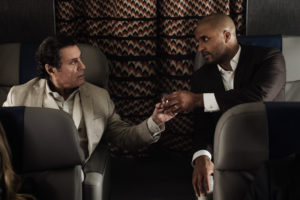
The main character and primary protagonist of the show is Shadow Moon, played by Ricky Whittle. According to Ian McShane (Wednesday), he’s a very passive, reactionary hero – at least at first. In the first episode (“The Bone Orchard”), there is a scene that will likely strike a chord with quite a lot of people. Whittle was slightly upset that he couldn’t get too specific with details. “It’s a book!” he said. “You know the Titanic sinks but you still watch it!” Nonetheless, he was able to speak a little bit about that scene in particular, which both ends the first episode and opens the second episode. “Unfortunately, it’s very much a part of our history, especially as a man of color,” Whittle said. “The way it was shot was actually very beautiful, and it is gonna strike a chord with a lot of people, because it is important, and it’s an important story to tell.”
Whittle went on to say, “It’s something that actually still happens, people still assume that’s old history. No. We’re talking real stories here, about America. […] That’s something we can all relate to. You don’t have to be a black ex-con to be scared of people trying to threaten your life.”
Shadow’s wife, Laura, is white, and when discussing the use of sex in the show, Green pointed out that there is a sex scene between Shadow and Laura that ordinarily would have been a hot topic of discussion, but with the sheer amount of diversity in American Gods, it’s almost dull. “We have a sex scene with Ricky and Emily that no one has asked about, it’s the most ho-hum thing in the world,” said Green. “In any other show, without those preludes, that would have been the scene that we were talking about. Now it’s like, ‘eh, black man and a white woman’.”
As for Jones, it was important to him, playing such an iconic character in African culture, that Nancy be represented well, so he had a list of specific things that he wanted, one of which was that his wardrobe be representative of African heritage. Nancy originates in Ghana, and Jones’s one real thought was that he wanted him to be a king.
“This is not Armani, this is not European,” said Jones of Nancy’s bold, purple suit from his introductory scene in episode 2, “and my hope was that it would not be that way because it felt disingenuous to the character. It felt like we would have been homogenizing him, and that was important, and I had no battle. Everybody was like, ‘Yes, that’s what we think. Let’s do that.'”
Jones had plenty to say on Nancy’s tone of voice – he tried to incorporate different dialects (Caribbean, different African languages) in his speech as often as possible – as well as Nancy’s overall appearance. He’s meant to be sort of humorous, despite the fact that the things he is saying aren’t very funny. “I wanted him to be entertaining, but more than anything, I wanted anybody to be able to come to the conversation and not feel like they were getting yelled at.”
Diversity in American Gods: Women
I already wrote pretty extensively about the role of the female characters, but as this is an article about diversity in American Gods, I would be remiss not to mention it here. Suffice it to say, without the constraints of page limits and word counts, most if not all of the minor characters will be expanded on in the show. That means that the women, who were relegated to supporting roles in the book, will get bigger, more in-depth stories. But the important thing to the women playing those characters was making them relatable.
“[Laura’s] not good and she’s not bad,” said Browning, “she’s just trying to figure out what the hell everything means, which I kind of think is relatable, personally.”
Kristin Chenoweth, who plays Easter, said of her character, “She just wants to be helpful and included and get along. I think a lot of people in this world can understand that. A lot of us just want to be included.”
Badaki felt that the changes to Bilquis – who is a prostitute in the novel and is merely online dating on the show – went a long way towards making her character more relatable. “I think bringing it around that way makes it more of a story about yes all of our search, the search that we all go through to see and be seen and to connect and reach out. […] I think it’s broadened the range for who can connect with that character.”
Diversity in American Gods: Religion
“This is not a religious show, but it is a show about faith, about whatever you have faith in, be it a badly played seventh on a guitar or whatever it is,” said McShane. “If you believe in something, you’ll be a better guy than you will if you just don’t believe in anything.”
Obviously a show called American Gods is going to have some religious content; it’s literally in the title. The diversity in American Gods manifests in how many religions and religious pantheons are represented in the story. Many of the episodes open with a vignette called “Coming to America” which generally features an origin story for how one of the old gods ended up in America. In the first three episodes, we are introduced to a Norse god, a West African god, an Islamic god, and an Egyptian god. Over the course of the season – and the series, provided the show gets renewed – we’ll meet many more. Chenoweth mentioned that in her first scene – which doesn’t occur until episode 8, the finale – Easter is holding a dinner party for all the different versions of Jesus. (“On her damn day!” she said, slamming her fist on the table.)
“One of the things that we regret about the first season is that we couldn’t hit all the continents in the first season,” said co-executive producer Bryan Fuller. “There’s so many gods. We haven’t gotten to any Asian gods. There’s many fascinating ones that we want to incorporate into the show.”
Religion is an extremely contentious topic in America, especially right now, but Chenoweth sees the importance of acceptance and tolerance. She was asked about how she, a Christian who is very vocal about her faith, approached her role of a pagan goddess. “I might have made a decision to do a part that is going to be attached to controversy with my own faith-based group,” she said, “but I think it should be the opposite. I think there are, in a time when Christianity is looked at – judgmental, non-acceptant – we should be more like Jesus. […] I think that’s what we are supposed to do. I think we are judged as well, and we haven’t helped ourselves. Just like the Muslim community is judged. We’re not all the same. And that’s another part of the show that I really appreciate it.”
Speaking of Muslims, the women in American Gods aren’t the only ones who see their roles get expanded. “[…] now we get to follow Salim and the Jinn and they both become more important,” said Gaiman. “Salim’s story’s taking us through season 1 and the Jinn will become a lot more important in season 2. That’s the great thing about American Gods. Because I only had a certain amount of room when I was writing it, I brought on more characters than you get to find out about. And what’s lovely now is everyone who gets mentioned in there, they can all play their part in the plot.”
Diversity in American Gods: Sexuality
“When Michael and I first sat down and started talking about the adaptation,” said Fuller, “our first conversation was, ‘Okay without reading the book again, what are the things that you remember that stood out to you?’ and Salim and the Jinn were stories that we both remembered and resonated to us in completely different ways.”
Though the scene with Salim and the Jinn is apparently the most expensive piece of gay erotica ever filmed – a fact that makes Neil Gaiman “so proud” – for Fuller and Green, it was important to convey the sensuality and romance of the moment. “That was something that was very important to us,” said Fuller, “and also we wanted it to be incredibly visual and gorgeous and wanted to convey a sense of sexuality cinematically in both the scenes – the Bilquis scene and the Salim and the Jinn scene – were really about how do you convey that sensuality without just setting up the camera and having people go at it.”
“We wanted those things not to be lurid but beautiful and captivating,” said Fuller, “and for heterosexuals to watch the love scene between these two men and not go ‘ewwww’ but go ‘that’s gorgeous and sexuality is beautiful’.”
“It was our goal from day one is the show was gonna have sexuality,” said Green, “but as long as it was rooted in character and story and was integral – as opposed to something cuttable – then it was something we would stand behind, be proud, and do as artfully as we knew how. And I think that’s true of all the sexual content we have in the show.”
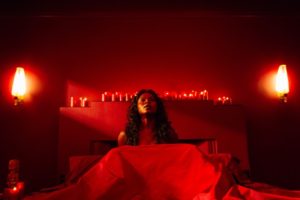
For Badaki, playing Bilquis was incredibly empowering, because while roles for women are starting to get better, it’s still all-too-common to find female characters pigeonholed into specific tropes – like the seductress or the whore. For Bilquis, sex is basically a religious experience, and she’s using it to establish connections with people, so the show doesn’t vilify her for exploring her sexuality. “I had to ask myself, what does sensuality mean, what does intimacy mean, all of these questions that I had maybe myself shied away from a little bit,” said Badaki. “And with this role you can’t shy away from it, you have to dive right in. And I was just so joyful at how empowering it was. Because first off, I was actually asking the question, which I think that’s been the first step for a lot of us. […] That became a conversation starter, talking about something that people don’t necessarily want to talk about. I had people reaching out on Twitter and all of that – it was mostly women – just excited saying, ‘Oh my goodness, you’re owning sex! This is happening!'”
Said Fuller of Badaki, who grew up in Nigeria, “So for her […] to come in and play this woman who is so empowered by her sexuality and in control of her sexuality, it’s a valuable lesson that I think a lot of women in cultures who are dealing with suppression can be inspired by.”
As a side note, it’s refreshing to see that diversity in American Gods translates to equal opportunity nudity. I watch Game of Thrones and am often annoyed by what I feel are gratuitous boob shots, but on American Gods there are just as many naked men as there are women, and it doesn’t feel like the nudity is there for nudity’s sake – nor does it feel like it’s there to be shocking.
Crafting the Diversity in American Gods
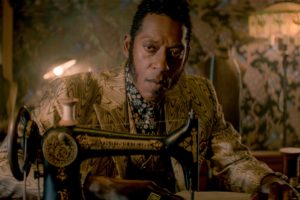
Collaboration was a big thing when it came to the diversity in American Gods. Jones mentioned that he had several discussions about how he felt his character should be portrayed, and as a fan of the novel he felt he already had a fairly good grip on Nancy to begin with. Badaki is ready to hand Fuller an honorary woman card for being willing to listen to her experiences.
“The source material is so rich and has so many different points of view that we want to represent them,” said Fuller, “but it’s also Michael and I sitting down as two white guys telling the story of Mr. Nancy coming to America on a slave ship. And that’s something that arguably some people would say that we have no business telling that story because we don’t have that experience, but we know people who do have that experience and have empathy for that experience.”
Fuller also shared an anecdote about how Salim and the Jinn’s scene had to be shot twice, because since both the actors and the director are straight, they apparently were unaware of the mechanics of gay sex.
Gaiman was very pleased at how often Green and Fuller would ask questions about the book so that they could portray it accurately. “I remember with Bilquis,” said Gaiman, “[Bryan] phoned me up and said, ‘Okay, who are we casting? What is Bilquis racially?’ And I said, ‘Well, Bilquis is the Queen of Sheba, and as far as we know, that’s black. And that’s African black, and we don’t know historically where Sheba was – there’s some ambiguity – but we have the Son of Solomon, we have that line about ‘I am black and I am beautiful’, and you’re going black there.’ And he’s like, ‘Great.'”
The Importance of Diversity in American Gods
“One of the reasons we were excited to adapt the book is because it provides a springboard to talk about things that are important to talk about and to write about things that we need to write about,” said Green.
“It’s a conversation starter,” said Fuller. “We don’t enter into these issues that we know some people will find very inflammatory. Gay Muslim men having sex is going to freak a lot of people out. I remember showing my partner that sequence, and he was like, ‘That was beautiful.’ And I was like, ‘It’s gonna freak people out.’ And he was like, ‘Is that why you’re doing it?’ And I was like, ‘No, I’m doing it because it’s beautiful. But I know it’s going to freak people out.’ And that’s okay. People need to get freaked out.”
Said Chenoweth, “[…] we live in an interesting time, where people are trying to find their place and trying to find how they fit in a time when we have multiple choices and we have an interesting political world. I think [Easter’s] that person. I think she, in some ways, represents the audience. Some of us, a lot of us, feel held back by the economy, by what choices we have, which are very few now.”
“[…] there’s something really out of balance right now,” said Crispin Glover, who plays Mr. World, “and really actually has been for quite a while, having to do with corporate controls that are not good for people at large. I feel that this – it might not seem like it but this writing has to do with that as well.”
Jones thinks that his character’s introductory scene will resonate with a lot of different groups, not just the black community to whom his speech is directed. “[…] it applies to so many groups, it doesn’t simply apply to African-Americans. It applies to women, it applies to people who are disabled, it applies to cis and trans and there’s a thousand other categories that we haven’t even gone through that don’t even get into the diversity conversation that we pretend are invisible that we deal with every day of our lives.”
“In modern society we never listen,” said Whittle. “We’ve got two ears, two eyes, one mouth and we should be listening and watching twice as much as we speak but we don’t. We just pipe up all the time.”
America is a land of immigrants, and it always has been. It is a country of different races, religions, sexualities, and more, and it is vital to tell the stories of people who would traditionally be considered “other”. I don’t believe you can truly grow as a person until you’ve examined a story that’s completely different from your own.
Jones was asked to explain why people should watch American Gods. “[…] if you truly care about this s–t,” he said, “if it truly speaks to your soul, we invite you to become part of the conversation with people who really care about these things at the inclusion of us all. […] for me, we are all truly in it together. That’s what the conversation needs to be about. That’s what this show brings to light. If you care about that. But if it’s not, I don’t think it should be our role to convince you. For me, this conversation is for everyone. I mean, it speaks to the very thing that we are yelling about. We are saying that we all deserve to have a voice. We’re saying that we all deserve to be treated respectfully.”
As a cis, white, possibly straight woman who was raised Christian, I’ve enjoyed the opportunity to explore the stories of people different from myself. I moved from a mostly-homogenous small, rural town to New York City, and just being around people not like me has changed my outlook and perspective. Media has helped – books and movies featuring characters who are outside my world view. It’s something that the cast of American Gods is hoping that people will take away from the show.
“We asked ourselves at every point, ‘Should we do this?'” said Green, “and a lot of times the answer is ‘We have to’. And we will do our best to do it correctly.”
Said Jones, “One of the things that makes me crazy is this: I have two little black girls. They are mixed, their mother is Italian and white, but they are mixed kids, but they will always be seen as little black girls. At the end of the day, I think it’s always funny when people say, ‘Oh, you had two girls, too bad.’ And I always want to punch that person in the face. Like, what, I gave birth to two second class citizens, too bad for me? No, awesome for me. Awesome people, awesome humans. Because they’re not men, they’re somehow less than, and I’m supposed to take that as a father and ra-hoo that? Get the f–k out of my face. So for me, that type of conversation being had about the art and about the image that I want people to see my daughters in is important art. Because all of the other images don’t really tell us that. ’60s, ’70s movie stars slap women left and right wantonly, it wasn’t a big deal. You’ve been programmed to think that these people are second class citizens by the entertainment. So is it not the role of entertainment to reprogram to the values that we believe that are important today? It is. But again, if you’re busy, don’t watch.”
As much as American Gods is a story about America, the cast believes that it has an element of universality. “I think it applies anywhere,” said McShane. “I think it applies to every country in the world, not just America. America just happens to be the place that most people look to for news.”
But behind the diversity in American Gods, at its core it is an entertaining story that hopefully a lot of people will identify with and enjoy. “Yeah, it’s fantasy and there’s all these kind of crazy elements,” said Whittle, “but it’s very grounding. You’ve got this buddy-buddy roadster between Wednesday and Shadow, you’ve got a beautiful love story in not only just Laura and Shadow but also the Jinn and Salim. There’s real life stories here that any person who just wants to be entertained can enjoy.”
American Gods premieres Sunday, April 30th, on Starz.
Author: Jamie Sugah
Jamie has a BA in English with a focus in creative writing from The Ohio State University. She self-published her first novel, The Perils of Long Hair on a Windy Day, which is available through Amazon. She is currently an archivist and lives in New York City with her demon ninja vampire cat. She covers television, books, movies, anime, and conventions in the NYC area.
Help support independent journalism. Subscribe to our Patreon.
Copyright © The Geekiary
Do not copy our content in whole to other websites. If you are reading this anywhere besides TheGeekiary.com, it has been stolen.Read our

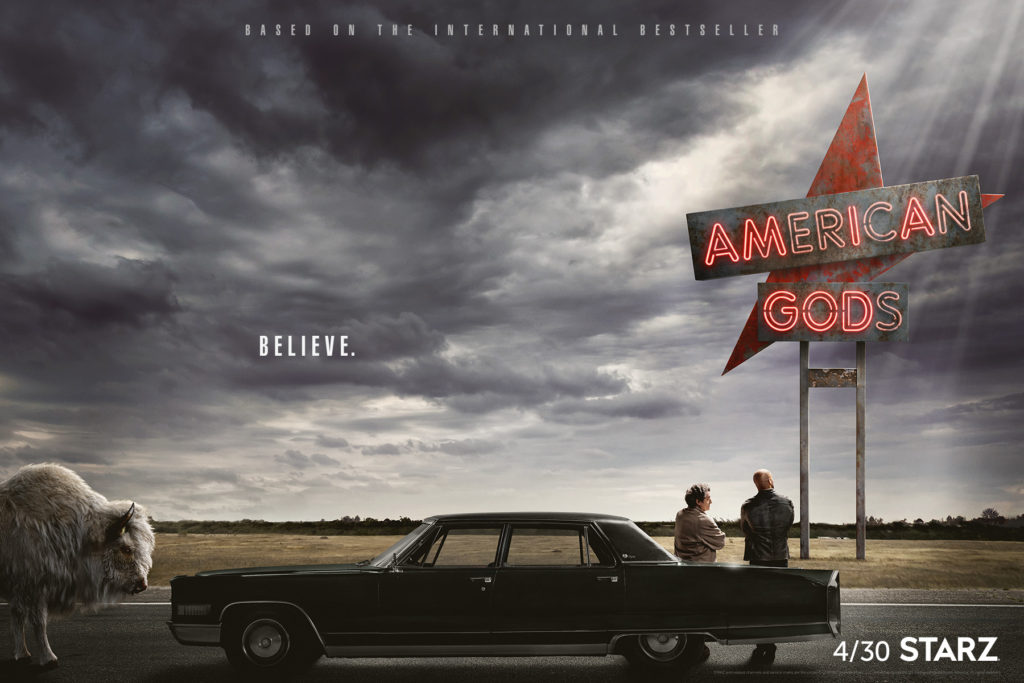
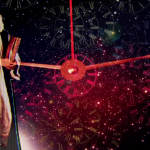

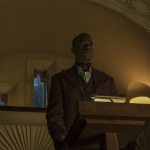


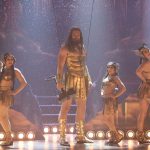
Diversity enhances nothing.
I was going to reply to the content of your comment, but I got sidetracked by imagining you carefully crafting this response with a dark, romantic sense of satisfaction. “That’ll show them. Those idealistic fools. Art is dead and love is a lie and ONLY I SPEAK THE TRUTH.”